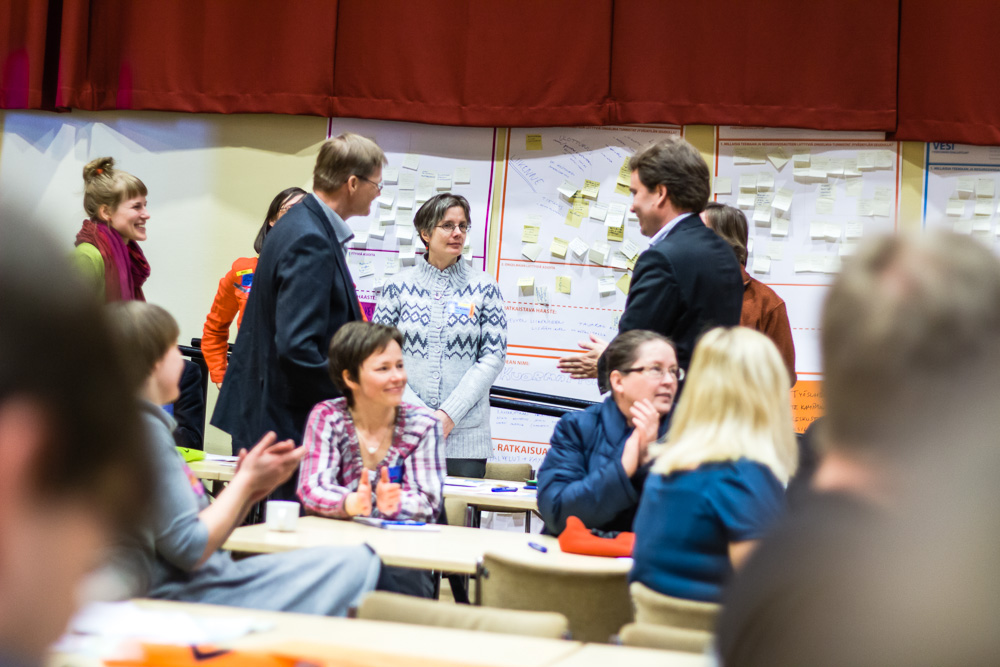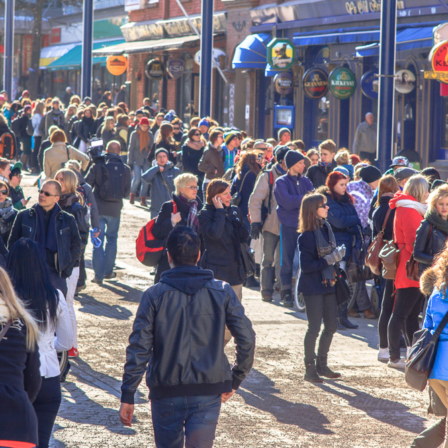The Towards resource wisdom project was launched in Jyväskylä on 3 April, 2013, when the city’s Aalto hall rang to the sound of enthusiastic residents, full of ideas on the sensible use of natural resources and the development of sustainable solutions to the city’s problems. “It is from wisdom like this that growth is created,” said Mayor Markku Andersson in his opening speech.
As a term, resource wisdom may seem strange, but that did not hold back Jyväskylä residents on a sun-kissed Wednesday in April, when Sitra and the City of Jyväskylä held the opening seminar for the Towards resource wisdom project. The crowded seminar hall soon became a hotbed of solutions for piloting resource wisdom and a hive of seminar discussion. These discussions also spilled over onto Facebook and Twitter.
“Resource wisdom is a broader concept than resource efficiency. Ability to manage natural resources promotes well-being and sustainable development,” explains project leader Johanna Kirkinen, a leading specialist from Sitra.
“Raw materials are becoming scarcer and their prices are rising, while the population grows and climate change continues. For everyone on this planet to live like a Finn, we’d need 3.5 times the Earth’s natural resources per year – we simply cannot go on like this,” says Kirkinen. “However, resource wisdom highlights the positive rather than just the negative aspects of this situation: this is an opportunity to come up with new, sustainable ways of doing things!”
Timo Rusanen, Development Director of the City of Jyväskylä, agrees with Kirkinen, pointing out that Jyväskylä is already implementing resource wisdom, for example by using ashes from the Keljonlahti power plant to fertilise nearby forests. “We need more examples like this. This joint project with Sitra provides Jyväskylä with an important opportunity in a challenging economic situation,” Rusanen says.
At the seminar, Mayor Markku Andersson enlarged on how he views resource wisdom as a key future success factor. “It is from wisdom like this that growth is created. The focus is on searching for new solutions, rather than bemoaning structural change.”
From local to global?
However, Sitra’s President Mikko Kosonen is concerned that the Nordic countries’ success in combining economic growth with social justice has been achieved partly at the expense of ecological sustainability. “In the future, well-being and growth cannot be built on the wasteful use of natural resources. This makes resource wisdom a core issue,” Kosonen insists.
Sitra views the creation of a joint operating model for a resource-wise city, which can be applied anywhere in Finland, as crucial.
“This is a complex phenomenon, so on a larger scale it may be difficult to manage,” says Kosonen. “Locally, however, we can take concrete action and develop the way we use our natural resources. The same challenges are being faced worldwide and there is demand for effective solutions.”
Kosonen’s words provided Bill Randall , the Mayor of Brighton & Hove in the UK, with the opportunity to talk about how his home town has begun to solve similar challenges in Britain. Brighton is one of the cities applying the One Planet Living approach. In simple terms, this means bringing the city’s consumption within the limits of a single Earth, rather than behaving as if Earth had three times its actual capacity. In practice, this has meant measures such as developing public transport, increasing bicycle use, reuse of waste and urban farming.
“We run Britain’s most-used bus system. Some of our buses run on used cooking oil. Wasteland and roofs are used as flower and vegetable gardens, public buildings are equipped with water-saving plumbing and fixtures, and the popularity of local food has increased tremendously,” Randall explained to the conference, drawing enthusiastic applause.
While promoting growing boxes in one city may sound like small potatoes, it could play a major role in the future. Director of Environment DG’s Directorate E, Timo Mäkelä, reminded those at the seminar of certain facts about the future, such as the prediction that the need for food will increase by 70 per cent by 2050. Dramatic rises in food, energy and raw material prices will force us to rationalise our resource use.
According to Mäkelä, resource wisdom also provides a way out of the economic crisis: “It has been calculated that a 15 per cent increase in resource efficiency would boost Europe’s GDP by 3.6 per cent and generate 2.5 million new jobs. In other words, resource wisdom forms part of an effective economic and employment policy. It would increase competitiveness, help ensure a sufficient supply of raw materials, boost overall security of supply, generate new growth models, and improve the employment situation.”
Brainstorming
Practical examples of Finnish resource wisdom were presented by the 2013 CTO of the Year Kenneth Ekman, CEO of CrisolteQ Oy, a pioneer in the recovery and reuse of waste. An introduction to ‘The future challenges of Central Finland and the year 2020’ was provided at a seminar by Eija Heinonen, Development Director at the Centre for Economic Development, Transport and the Environment (ELY Centre) for Central Finland.
In the afternoon’s workshops, enthusiastic townspeople began to shower the sessions with solutions for the more rational use of resources in Jyväskylä. Arranged by Hub Jyväskylä, also known as HUB JKL, this brainstorming afternoon generated scores of piloting ideas, including an apartment building with an eco water system, ridesharing for children, an online store for local food, a mobile recycling service, a waste management market, a surplus food distributor, parking for delivery bikes, a social contract on renewable energy, and many more.
“This seminar hall is buzzing with creativity. Creativity means working together, refining our ideas. The city of Jyväskylä and Sitra can be proud of what’s been achieved today!” said musician and all-round philanthropist Mikko Kuustonen, shortly before performing a song whose chorus carried the sentiment: ‘There is no greater life beyond the one we’re living today’.



Recommended